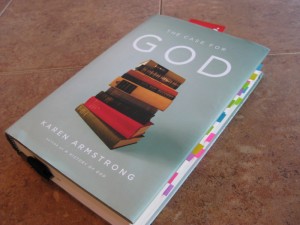I’ve just finished reading Karen Armstrong’s The Case for God (Knopf, 2009). It’s a big book to wade through, but the clarity and grace of her writing make it a pleasure. Even more, her ideas stimulate my own thinking. I won’t try to do a review or a summation, but here is one aspect that resonates with me.
One of the gifts of The Case for God is that Armstrong articulates clearly how the modern Western mind came to equate truth with certainty, knowledge with logic and definitions, and credibility with science. Even more, she shows how this way of thinking resulted in a notion of God disconnected from the heart of religious longing.
Rather than allowing language and logic to carry us to their limit, then point us toward the mystery that cannot be named or known, we settled for a list of God-traits. Our idea of God defined a being, with specific attributes, sitting at the next-higher level of creation. In Armstrong’s words:
The process that should have led to a stunned appreciation of an “otherness” beyond the competence of language ended prematurely. The result is that many of us have been left stranded with an incoherent concept of God. We learned about God at about the same time as we were told about Santa Clause. But while our understanding of the Santa Claus phenomenon evolved and matured, our theology remained somewhat infantile.
We need an understanding of God that holds up to our experience, and allows us to build a life around our faith. Armstrong points to the work of Gianni Vattimo and John D. Caputo as thinkers who embrace a way of seeing God that can speak to our time. She mentions in her notes a collection containing works by both of them, After the Death of God, edited by Jeffrey W. Robbins. I haven’t read it, but I’d like to.
This is how Armstrong describes Caputo’s view of our experience of God, and the unknowing that is “truth without knowledge”:
So how does Caputo see God? Following Derrida, he would describe God as the desire beyond desire. Of its very nature, desire is located in the space between what exists and what does not; it addresses all that we are and are not, everything we know and what we do not know. The question is not “Does God exist?” any more than “Does desire exist?” The question is rather “What do we desire?” Augustine understood this when he asked, “What do I love when I love my God?” and failed to find an answer.
An encounter with such mystery leaves us open, without certainty, thrillingly alive and humbled with awe. It points us to a reality that transcends our ordinary experience, calls us to be awake, and encourages us to seek ways of living out the ineffable truth that we are given.
Is it possible to live out this kind of truth in community? Can a church be built on faith that professes uncertainty and not knowing?


Great to find another fan of Karen Armstrong. Like you I have just finished the Case for God and felt very excited by the last chapter Death of God?
I am trying to prepare a talk for a group of Unitarians in April and hope to develop on this theme. It would be really great if we could develop into the kind of church you envisage – professing incertainty and unknowing. You have added value to Karen’s inspiration. Paul
I’m glad to find your comment, Paul. I thought it was an excellent chapter, too. I read it thinking that I don’t believe in the same God that the atheists don’t believe in. I understand God, if there is any understanding to profess of God, as something else entirely.
Good luck with your talk. I’d love to hear how it goes.